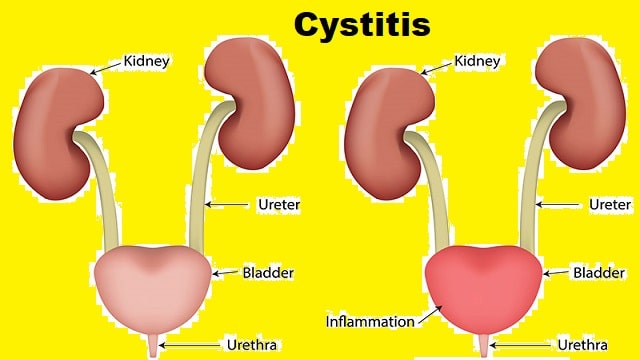Cystitis
Cystitis is a condition where the bladder becomes inflamed. A common cause of this condition is a bacterial infection. Although it can happen to anyone, this condition is most common in women.
This is because the size of the urethra (the main channel for urine to exit the body) in women is shorter than in men and is located closer to the anus. This condition makes it easier for bacteria from the anus to move and enter the urinary tract.
Symptoms of Cystitis
Common symptoms you need to be aware of are:
- A burning, stinging, or painful sensation when urinating.
- Constant urge to urinate.
- Fatigue and muscle pain.
- Frequent urination, but only a little comes out.
- There is pain or pressure in the lower abdomen.
- Urine is dark, cloudy, or has a strong odor.
- Pain during intercourse.
- Experiencing cramps in the back or stomach.
In some cases, cystitis can also affect mental health. Some people who deal with cystitis can also feel depressed or anxious.
In children, daytime wetting (when not usual) can also be a symptom of cystitis. Children with cystitis may also feel weak and lethargic.
Causes of Cystitis
There are many things that could be the cause of this condition, namely:
- Urinary tract infection (UTI)
- Drugs, for example in chemotherapy.
- Side effects of radiotherapy.
- Complications of other diseases or conditions, such as diabetes, menopause, kidney stones, or prostate enlargement.
- Is pregnant.
- Irritation due to chemicals, for example, soap containing perfume.
- Continuous use of catheters.
Some people have a condition called interstitial cystitis, where the bladder continues to swell, but there is no detectable infection.
The cause of this condition is difficult to determine and treatment is also more difficult than ordinary cystitis.
Cystitis Risk Factors
There are several things that can increase the risk, namely:
- Have had a recent urinary tract infection (UTI).
- Undergoing treatment with radiation or chemotherapy.
- In the middle of using a catheter.
- Are suffering from diabetes, kidney stones, or HIV?
- Having a spinal injury.
- Having a condition that affects the flow of urine.
- Becoming sexually active (for women).
- Is pregnant.
- Prostate enlargement (men).
Diagnosis of Cystitis
Well, the diagnosis of cystitis is done through a physical examination, including asking about the symptoms and medical history experienced.
A new diagnosis of cystitis can only be made if the examination is accompanied by further examinations.
For example, urine sample analysis to detect the presence of bacteria in urine and X-ray or ultrasound to find other causes of urinary tract inflammation. Then, from the urine sample can also be seen the causative bacteria and determine the appropriate antibiotic.
Another further examination that provides more detailed results is a cystoscopy.
In addition to seeing the condition of the urinary tract, this examination by inserting a small tube with a camera attached to the end of it can also be done for biopsy purposes or taking samples of urinary tract tissue for further examination in the laboratory.
Cystitis Treatment
Treatment for cystitis will depend on the cause. If it is caused by a bacterial infection, your doctor will usually prescribe antibiotics. Cystitis usually begins to improve within 1-2 days.
However, be sure to take all medications as directed. How long you need to take them depends on your condition, how often you get infections and the type of bacteria causing the infection.
In cases of interstitial cystitis where the cause is unknown, your doctor may recommend some lifestyle changes such as:
- Avoid spicy foods and foods high in potassium.
- Avoid smoking and drinking alcohol.
- Undergoing bladder training, to change your urination habits. Talk to your doctor about this.
If medications or other treatments don’t help, your doctor may recommend surgery, usually for chronic conditions, to correct structural problems.
Cystitis Prevention
Some things you can do to prevent cystitis are:
- Don’t hold back the urge to urinate.
- Avoid using bath soap or intimate organ cleaning soap that contains perfume.
- Drink plenty of water to prevent the growth of bacteria in the bladder.
- Wear soft cotton underwear.
- When cleaning intimate organs, do it by wiping from front to back (from Miss V towards the anus).
Complications of Cystitis
Cystitis can sometimes lead to other health problems, especially when bacteria enter the kidneys. This can cause a serious type of infection.
Other conditions associated with cystitis include irritable bowel syndrome (IBS), vulvodynia, fibromyalgia, chronic fatigue syndrome, lupus, panic attacks, and pelvic floor dysfunction. These can also cause blood to appear in the urine.
When to See a Doctor?
Contact a doctor immediately if you experience common symptoms of kidney infection, namely:
- Back pain.
- Fever and chills.
- Nausea and vomiting.
Get yourself checked immediately if you experience symptoms of cystitis. If you are diagnosed with cystitis and prescribed medication by a doctor.

